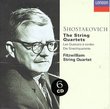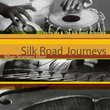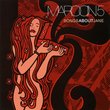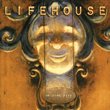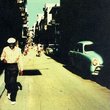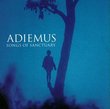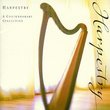| All Artists: Johann Sebastian Bach, Yo-Yo Ma Title: Bach: The Cello Suites Inspired By Bach, From The Six-Part Film Series / Yo-Yo Ma Members Wishing: 0 Total Copies: 0 Label: Sony Release Date: 2/17/1998 Genre: Soundtracks Style: Number of Discs: 2 SwapaCD Credits: 2 UPC: 074646320327 |
Search - Johann Sebastian Bach, Yo-Yo Ma :: Bach: The Cello Suites Inspired By Bach, From The Six-Part Film Series / Yo-Yo Ma
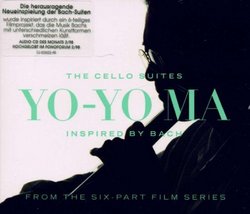 | Johann Sebastian Bach, Yo-Yo Ma Bach: The Cello Suites Inspired By Bach, From The Six-Part Film Series / Yo-Yo Ma Genre: Soundtracks
Though they were long misunderstood as mere technical hurdles, Bach's six suites for unaccompanied cello are among those rare works of music that offer inexhaustible rewards for performer and listener alike. Yo-Yo Ma gave ... more » |
Larger Image |
CD DetailsSynopsis
Amazon.com essential recording Though they were long misunderstood as mere technical hurdles, Bach's six suites for unaccompanied cello are among those rare works of music that offer inexhaustible rewards for performer and listener alike. Yo-Yo Ma gave a pathbreaking account of the suites back in the '80s (Suites for Unaccompanied Cello ) but returns to them here impelled by a unique and interdisciplinary approach. For this project, Ma engaged the talents of artists in different fields--ranging from a landscape artist to a Kabuki actor and figure skaters--to produce six short films as a visual correlative for the highly distinctive character of each suite. While the success of the films in illuminating Bach's creativity is decidedly uneven, Ma brings the music itself to life with a searing, quasi-vocal eloquence. His interpretations are probing, characterized by imaginative bowing and attention to the spacious architecture of Bach's score. This is especially clear in Ma's preference for broad, expansive tempos and patient spinning of filigreed detail. True, the generally Romantic cast of his conception can seem overdone and exaggerated in statement, as if Ma is more intent on overlaying his own personality on the discipline of the music. But the prayerful, meditative concentration he brings to the Sarabandes--listen to the single-lined, anguished tone painting in Suite 5--is utterly convincing. There is a sense of profound introspection here, while in the Sarabande of Suite 6 Ma's phrasing suggests we are in the same spiritual terrain as Beethoven's late quartets. Yet there is no lack of blistering energy and extroverted high spirits in some of the more overtly dance-oriented movements. While purists may complain of distortion in these accounts, Ma once again proves he has something vital to say with this music. --Thomas May Similarly Requested CDs
|
CD ReviewsA very spiritual performance P. Rah | Sion, Switzerland | 01/25/2001 (5 out of 5 stars) "Bach's suites for cello are a must for any music lover. Like all of Bach's music it has an enlightening quality and Ma's performance of these suites is simply stunning. He throws the stylistic dogma that bitterly divides people out the window and shares his feelings about the music with us. Many people who have reviewed this set have complained about a lack of rhythmic drive and thrust in some suites, but I don't think that Ma is being slack about rhythm at all. If one listens carefully enough, one will hear that the cellist has a drive which makes absolute sense rhythmically. I feel that this set is the most spiritual performance I have ever heard (and believe me, I've heard most of the available recordings), and in some suites (No.1, 2, 5 especially) Ma's playing has an inner quality that just transcends all possible musical dogmas and just lets the music be itself - one must remember that Bach was a deeply religious man and it shows in all of his works, and this religious spirituality is what I feel in this performance. Also, some people have complained about the over-romanticising of the suites. But music is not ALWAYS about stylistic correctness, it is about true emotion and Ma is a true comminucator of these emotions. Too much analysis of music has divided opinions too much, and while I admire many facets of the authentic movement, I feel that the insistence to play baroque or classical music in such a way means that one loses the point of playing music. Just because Bach lived in the 17th century, it doesn't mean that he didn't have feelings like people now. Ma's playing completely structured (something that was lacking in his first recording of the suites), and because it is so firmly grounded, he can take liberties which do justice to the music more than an injustice. If it was just passion all-the-way-through, you would have a very messy performance, but thanks to Ma's intelligence equalled with passion, one can really listen to the music and be transported by it. This is truly music that you have to close your eyes to listen to, because it is so pictorial. Great musicians have this thing in common - they can make the music breathe and tell a story, and Yo-Yo Ma is one of them. He doesn't let his ego get in the way of the music, but his mastery of the instrument and Bach's eternal music really tells a pictorial story and it is something to really savour. Gloria in excelsis deo!" Great Album John | Dallas, TX United States | 01/08/2005 (4 out of 5 stars) "I am writing because there were several reviews commented that this version is tuned lower and Mr. Ma is taking liberty to the music as written, concluding that this is not a good album. This cello solo suite is tunned to how Bach inteded to be played. Modern music post-WWI uses 440 Hz for the concert pitch. In Bach era, they were tuned to 421-425 Hz for orchestra/solo/vocal. About half step lower. He seems to play this piece on "well-tempered" tuning system and tuned to 421-425 Hz A, which is the reason I think this recording sounds more musical than the earlier recording (which is played on 440Hz A and more modern equal temperment tuning). It brings out more key color charcteristic and sounds more musical and pleasing. If you are not sure what I am talking about you should do some research on tempered tuning system and variations of concert pitch. Pretty much all the modern orchestra plays music pieces completely different than what the composer intended. " Outstanding George Durkee | Twain Harte, CA USA | 10/31/1998 (5 out of 5 stars) "I suspect I don't have all that well-tuned an ear, but Ma's latest recording of the cello suites is truly outstanding-especially when combined with the video series that came out with it. I enjoy this recording somewhat more than Janos Starker's EMI (?) recording of the cello suites which I also have. Ma seems to lighten the mood of them somewhat--more, as he commented, of a prayer. The mood in Starker's interpretation seems to me darker, lonelier (though I think it would be wrong to say that one is 'better' than the other. I find myself listening to one or the other to fit my mood.)Ma's greatest achievement, both here and in what he records of other stuff, is to bring an incredible multidisiplinary energy to the music; making it much more accessible to wider audiences. There's a scene in the film of him playing one of the suites on a traffic island in New York (?); his case is open for money and a sign next to him reads: "There is nothing remarkable about it. All one has to do is hit the right notes at the right time and the music plays itself.--J.S. Bach"Bravo."
|

 Track Listings (21) - Disc #1
Track Listings (21) - Disc #1